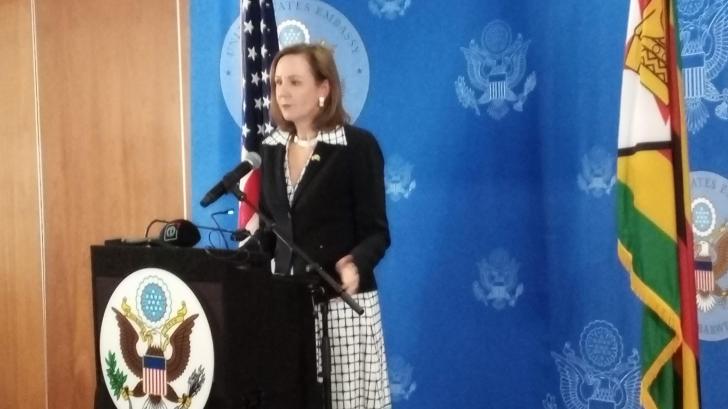News / National
U.S Embassy offered sanctions activists money to leave its premises
26 Oct 2024 at 11:46hrs |
0 Views

Anti-sanctions activists, camped outside the United States Embassy in Harare for over five years, have claimed they were offered luxurious incentives to leave the premises but turned them down, asserting their commitment to their cause. The group, known as the Broad Alliance Against Sanctions (BAAS), has maintained a presence at the embassy since March 2019, vowing to remain until the U.S. sanctions against Zimbabwe are lifted.
During a poorly-attended anti-sanctions march on Friday, coinciding with Anti-Sanctions Day, BAAS vice chairperson Rachel Kamangira revealed that the activists had previously met with former U.S. Ambassador to Zimbabwe, Brian Nichols. She alleged that Nichols offered them luxury cars, houses, and substantial financial support in exchange for vacating the embassy grounds.
"We had a meeting some time back with Ambassador Brian Nichols, who asked us to leave the embassy premises and offered us each luxury cars, houses, and money that would last a lifetime," Kamangira stated. "We refused to be bribed; we cannot be sellouts. We are still here, we refuse to be bribed, and we are not going anywhere until the sanctions are removed."
The protest comes in the wake of recent developments regarding U.S. sanctions. In March, President Joe Biden issued an executive order ending a Zimbabwe sanctions program that had been in place since 2003, while simultaneously imposing sanctions on 11 individuals for alleged human rights abuses and corruption. The original sanctions were a response to violent and uncompensated land seizures from predominantly white commercial farmers in the 2000s.
While the sanctions target a limited number of individuals, the Zimbabwean government contends that their broader impact adversely affects ordinary citizens, urging the international community to reconsider their stance.
The BAAS activists, however, remain steadfast in their position, viewing the sanctions as a direct assault on Zimbabwe's sovereignty and development. Despite the challenges of maintaining their protest amid dwindling public support, their resolve to advocate for the removal of sanctions continues unabated.
During a poorly-attended anti-sanctions march on Friday, coinciding with Anti-Sanctions Day, BAAS vice chairperson Rachel Kamangira revealed that the activists had previously met with former U.S. Ambassador to Zimbabwe, Brian Nichols. She alleged that Nichols offered them luxury cars, houses, and substantial financial support in exchange for vacating the embassy grounds.
"We had a meeting some time back with Ambassador Brian Nichols, who asked us to leave the embassy premises and offered us each luxury cars, houses, and money that would last a lifetime," Kamangira stated. "We refused to be bribed; we cannot be sellouts. We are still here, we refuse to be bribed, and we are not going anywhere until the sanctions are removed."
The protest comes in the wake of recent developments regarding U.S. sanctions. In March, President Joe Biden issued an executive order ending a Zimbabwe sanctions program that had been in place since 2003, while simultaneously imposing sanctions on 11 individuals for alleged human rights abuses and corruption. The original sanctions were a response to violent and uncompensated land seizures from predominantly white commercial farmers in the 2000s.
While the sanctions target a limited number of individuals, the Zimbabwean government contends that their broader impact adversely affects ordinary citizens, urging the international community to reconsider their stance.
The BAAS activists, however, remain steadfast in their position, viewing the sanctions as a direct assault on Zimbabwe's sovereignty and development. Despite the challenges of maintaining their protest amid dwindling public support, their resolve to advocate for the removal of sanctions continues unabated.
Source - NewZimbabwe
Join the discussion
Loading comments…



























